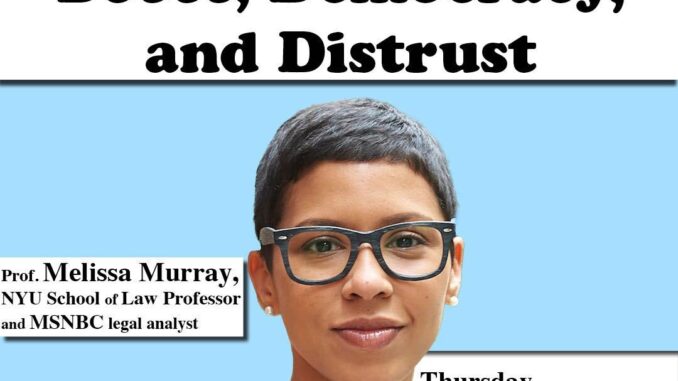
By Reima Choute
The Wolfe Institute at Brooklyn College invited an MSNBC legal analyst and NYU School of Law Professor Melissa Murray to deliver the Samuel J. Konefsky Memorial Lecture on Nov. 9. At the event titled “Dobbs, Democracy, and Distrust,” Murray discussed the Dobbs v. Jackson Women’s Health Organization case and its potential harmful ripple effect.
This pivotal case centered on the Mississippi Gestational Age Act established in 2018, imposing strict limitations on abortions past 15 weeks of pregnancy, except in cases of medical emergencies and fetal abnormalities. The consequential ruling by the Supreme Court stripped the federal right to abortion in June last year, granting states the authority to impose severe bans.
Murray’s concerns echoed far beyond the immediate implications for abortion rights. She highlighted the potential ramifications of the Supreme Court’s decision on other cases, such as Obergefell v. Hodges, a case affirming marriage equality for same-sex couples. The fear was if Roe v. Wade was overturned, it could pave the way for further erosion of hard-fought rights such as the right for same-sex marriages.
The Court’s decision to overturn an established precedent sowed seeds of distrust, raising concerns about whether other rights were at risk of being taken away or modified to favor one specific viewpoint. Murray mentioned several different cases to allow the audience to hear the many occasions in which the rights of millions of people were not taken into consideration, covering topics such as interracial marriage.
Central to Murray’s discourse was the Court’s failure to uphold equal protection under the law.
She expressed her concern regarding democracy within the Court in reference to overturning a past Supreme Court ruling. She shared that she does not feel as though the Supreme Court is taking majoritarian preferences into account.
“The Court in majority opinion understands democratic deliberation on abortion to proceed in only one direction, towards the further restriction and curtailment of abortion rights. It does not even conceive the possibility that sexual liberation might lead to the preservation or even the expansion of reproductive freedom,” Murray said at the event.
Moreover, she noted the portrayal of a fetus as an “underrepresented and vulnerable entity needing judicial protection,” while simultaneously describing abortion as murder. This complex narrative surrounding a fetus and the ethical debate over abortion was a focal point of her discussion.
Murray also shed light on the sacrifices women often make in the pursuit of political engagement as she showed images of mothers struggling at polling stations with their children clinging to them, painting a memorable picture of the challenges faced by women trying to exercise their right to vote. Additionally, she emphasized the delayed entry of women into political roles, often after their children have grown up and left the family as adults.
BC students who attended the event expressed their concerns regarding the Supreme Court and their decisions for several cases, especially Dobbs v. Jackson, as they have the potential to affect laws in which women will be negatively impacted in the end. “Our constitutional rights are not as solid as they used to be due to the fact that rights are enumerated. Clearly, that can be manipulated to take rights away like we saw in Roe. Can we use that loose interpretation of the Constitution to get back some of those rights?” said a BC student in the audience.
Murray’s insights urged a reexamination of the complexities of legal decisions, the delicate balance between established legal norms and evolving societal values, and the multifaceted challenges faced by individuals seeking to engage in the democratic process.
“We have to get out and vote in massive numbers […] It’s not impossible, it just has to be massive […] You gotta be ready to be persistent. You gotta be ready to pack a lunch and limber up and stay hydrated because it’s not a one-and-done,” Murray said, highlighting collective responsibility and the importance of focusing on all issues and all parts of the government that people need to advocate for to see change.
